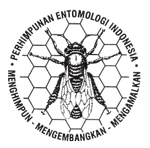Keefektifan Telenomus remus (Nixon) (Hymenoptera: Scelionidae) dalam mengendalikan hama tanaman bawang daun Spodoptera exigua Hí¼bner (Lepidoptera: Noctuidae)
DOI:
https://doi.org/10.5994/jei.5.2.81Keywords:
Telenomus remus, Spodoptera exigua, welsh onion, biological control, egg parasitoidAbstract
The objective of this research is to study the effectiveness of T. remus as biocontrol agent for S. exigua. The study was conducted by releasing a set of T. remus females on potted onion plants that have been attacked by S. exigua. Three different parasitism level was artificially created by releasing different numbers of females: low rate parasitism (release of 4 adult females), moderate parasitism (7 females) and high parasitism level (11 females). The result of this study showed that T. remus is effective to control S. exigua population. Up to 48.2% of S. exigua. population was able to be suppressed by the high parasitism level. Rate of parasitisation was more when more adult female T. remus was released. Release of 11 adult female of T. remus can increase the population level of the parasitoid up to 24.1 times than the initial population. This express that T. remus is a mortality factor which can regulate the population of S. exigua. However, the succesfull parasitisation of T. remus is also dependent on environmental factors such as temperature, humidity, food, and host suitability.Downloads
Downloads
Published
How to Cite
Issue
Section
License
Authors who publish with this journal agree to the following terms:
- Authors retain copyright and grant the journal right of first publication with the work simultaneously licensed under a Creative Commons Attribution 4.0 International License that allows others to share the work with an acknowledgement of the work's authorship and initial publication in this journal.
- Authors are able to enter into separate, additional contractual arrangements for the non-exclusive distribution of the journal's published version of the work (e.g., post it to an institutional repository or publish it in a book), with an acknowledgement of its initial publication in this journal.
- Authors are permitted and encouraged to post their work online (e.g., in institutional repositories or on their website) prior to and during the submission process, as it can lead to productive exchanges, as well as earlier and greater citation of published work (See The Effect of Open Access).








